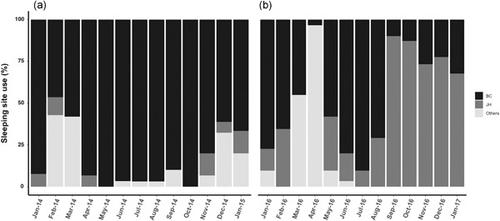当前位置:
X-MOL 学术
›
Am. J. Primatol.
›
论文详情
Our official English website, www.x-mol.net, welcomes your feedback! (Note: you will need to create a separate account there.)
Influence of rainfall on sleeping site choice by a group of anubis baboons (Papio anubis)
American Journal of Primatology ( IF 2.4 ) Pub Date : 2020-12-18 , DOI: 10.1002/ajp.23223 Alexandre Suire 1, 2 , Lynne A Isbell 2, 3, 4 , Laura R Bidner 2, 3, 5 , Yushin Shinoda 6 , Munemitsu Akasaka 6, 7 , Akiko Matsumoto-Oda 2, 8
American Journal of Primatology ( IF 2.4 ) Pub Date : 2020-12-18 , DOI: 10.1002/ajp.23223 Alexandre Suire 1, 2 , Lynne A Isbell 2, 3, 4 , Laura R Bidner 2, 3, 5 , Yushin Shinoda 6 , Munemitsu Akasaka 6, 7 , Akiko Matsumoto-Oda 2, 8
Affiliation

|
For diurnal nonhuman primates, shifting among different sleeping sites may provide multiple benefits such as better protection from predators, reduced risk of parasitic infection, and closer proximity to spatially and temporally heterogeneous food and water. This last benefit may be particularly important in sleeping site selection by primates living in savanna‐woodlands where rainfall is more limited and more seasonally pronounced than in rainforests. Here, we examined the influence of rainfall, a factor that affects food and water availability, on the use of sleeping sites by anubis baboons (Papio anubis) over two 13‐month study periods that differed in rainfall patterns. We predicted that during wet periods, when food and water availability should be higher, the study group would limit the number of sleeping sites and would stay at each one for more consecutive nights than during dry periods. Conversely, we predicted that during dry periods the group would increase the number of sleeping sites and stay at each one for fewer consecutive nights as they searched more widely for food and water. We also predicted that the group would more often choose sleeping sites closer to the center of the area used during daytime (between 07:00 and 19:00) during wet months than during dry months. Using Global Positioning System data from collared individuals, we found that our first prediction was not supported on either monthly or yearly timescales, although past monthly rainfall predicted the use of the main sleeping site in the second study period. Our second prediction was supported only on a yearly timescale. This study suggests that baboons’ choice of sleeping sites is fluid over time while being sensitive to local environmental conditions, one of which may be rainfall.
中文翻译:

降雨对一群阿努比斯狒狒(Papio anubis)的睡眠地点选择的影响
对于昼夜非人类的灵长类动物,在不同的睡眠地点之间转移可能会提供多种好处,例如更好地保护动物免受掠食者的侵害,降低寄生虫感染的风险以及更接近时空异质食物和水。最后的好处对于居住在热带稀树草原林地的灵长类动物的睡眠地点选择而言尤其重要,与雨林相比,那里的降雨更为有限,而且季节性季节更为明显。在这里,我们检查了降雨(影响食物和水供应的因素)对阿努比斯狒狒(Papio anubis)使用睡眠场所的影响)在两个为期13个月的研究期间,降雨时间有所不同。我们预测,在潮湿的时期,当食物和水的供应量应该更高时,研究组将限制睡眠地点的数量,并且与干旱时期相比,每个人在每个地点停留的时间要连续得多。相反,我们预测,在干旱期间,由于他们会更广泛地寻找食物和水,因此他们会增加睡眠地点的数量,并在每个晚上停留的时间更少。我们还预测,与干旱月份相比,在潮湿季节,白天(07:00至19:00之间),该组会更频繁地选择靠近所使用区域中心的睡眠地点。使用来自衣领的全球定位系统数据,我们发现每月或每年的时间尺度均不支持我们的第一个预测,尽管过去的每月降雨量预测了第二个研究期主要睡眠地点的使用。我们的第二个预测仅在每年的时间范围内得到支持。这项研究表明,狒狒的睡眠地点选择会随着时间的流逝而变化,同时对局部环境条件敏感,其中之一可能是降雨。
更新日期:2021-01-04
中文翻译:

降雨对一群阿努比斯狒狒(Papio anubis)的睡眠地点选择的影响
对于昼夜非人类的灵长类动物,在不同的睡眠地点之间转移可能会提供多种好处,例如更好地保护动物免受掠食者的侵害,降低寄生虫感染的风险以及更接近时空异质食物和水。最后的好处对于居住在热带稀树草原林地的灵长类动物的睡眠地点选择而言尤其重要,与雨林相比,那里的降雨更为有限,而且季节性季节更为明显。在这里,我们检查了降雨(影响食物和水供应的因素)对阿努比斯狒狒(Papio anubis)使用睡眠场所的影响)在两个为期13个月的研究期间,降雨时间有所不同。我们预测,在潮湿的时期,当食物和水的供应量应该更高时,研究组将限制睡眠地点的数量,并且与干旱时期相比,每个人在每个地点停留的时间要连续得多。相反,我们预测,在干旱期间,由于他们会更广泛地寻找食物和水,因此他们会增加睡眠地点的数量,并在每个晚上停留的时间更少。我们还预测,与干旱月份相比,在潮湿季节,白天(07:00至19:00之间),该组会更频繁地选择靠近所使用区域中心的睡眠地点。使用来自衣领的全球定位系统数据,我们发现每月或每年的时间尺度均不支持我们的第一个预测,尽管过去的每月降雨量预测了第二个研究期主要睡眠地点的使用。我们的第二个预测仅在每年的时间范围内得到支持。这项研究表明,狒狒的睡眠地点选择会随着时间的流逝而变化,同时对局部环境条件敏感,其中之一可能是降雨。


























 京公网安备 11010802027423号
京公网安备 11010802027423号